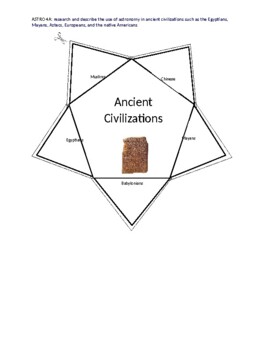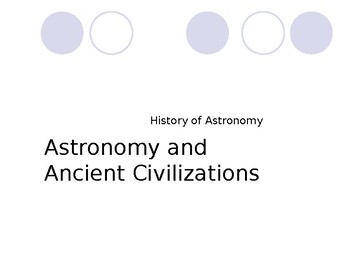Astronomy, the profound study of celestial bodies and phenomena, played an indispensable role in shaping the lives of ancient civilizations around the world. Its practical applications extended far beyond celestial observation and into the realms of timekeeping, farming, navigation, and even religious beliefs.

Image: www.teacherspayteachers.com
Timekeeping: Rhythm of Life by the Stars
One of the most significant contributions astronomy made to ancient civilizations was the development of calendars. By meticulously charting the movements of celestial bodies, such as the sun, moon, and stars, ancient astronomers could accurately predict the changing seasons and celestial cycles. Such knowledge was pivotal for agricultural societies, enabling farmers to plant and harvest crops at optimal times to maximize yields.
Farming: Harmony with Celestial Cycles
Beyond calendars, astronomy also aided in agricultural practices by providing calendars. The ancient Egyptians, for instance, relied on the star Sirius’s annual rising to herald the start of the Nile River’s flooding, which was essential for irrigation. This phenomenon, known as the heliacal rising of Sirius, allowed farmers to prepare for the upcoming inundation and maximize their harvests.
Navigation: Steering by the Heavens
In the realm of exploration and navigation, astronomy held a crucial role. Seafarers relied on knowledge of celestial bodies to find their bearings on vast bodies of water. The Polynesians, renowned navigators of the Pacific Ocean, used stars as guides, enabling them to traverse immense distances without losing their way. Such stellar navigation allowed civilizations to engage in trade, exploration, and cultural exchange far beyond their shores.

Image: www.teacherspayteachers.com
Astronomy and Beliefs: Celestial Mirrors of Divinity
Astronomy also intertwined with ancient belief systems. Celestial phenomena, such as eclipses, solstices, and comets, often bore religious and mythological significance. Ancient civilizations perceived celestial events as manifestations of divine will, influencing their religious practices and cultural narratives. The Maya, for example, had a complex cosmology that integrated astronomy, rituals, and prophecy.
Astronomical Observatories: Pyramids, Temples, and Stone Circles
Evidence of the significant role astronomy played in ancient cultures can be found in the impressive astronomical observatories they constructed. The Great Pyramids of Giza, the Stonehenge monoliths, and the ziggurats of Mesopotamia are notable examples of how ancient civilizations repurposed architectural wonders for astronomical observations. These structures aligned with celestial events, allowing individuals to track seasonal changes and predict celestial phenomena.
Practical Benefits beyond the Cosmos
Furthermore, astronomical insights brought practical advantages that extended beyond immediate celestial observations. The mathematics and geometry developed through astronomical calculations found applications in engineering, surveying, architecture, and urban planning. Such knowledge played a vital role in constructing monuments, temples, and entire cities with remarkable precision.
What Practical Value Did Astronomy Offer To Ancient Civilizations
https://youtube.com/watch?v=4wjvZv_1ckA
Conclusion
The practical value of astronomy in ancient civilizations was multifaceted and profound. It enabled societies to flourish by providing accurate timekeeping, guiding agricultural practices, aiding in navigation and exploration, shaping religious beliefs, and advancing knowledge in fields beyond astronomy itself. The celestial tapestry woven by ancient civilizations serves as a testament to human ingenuity and our enduring fascination with the wonders of the cosmos. As we continue to explore the vast expanse above, the contributions of our ancient celestial navigators remain an inspiration, shaping our understanding of time, space, and our place in the grand cosmic drama.
